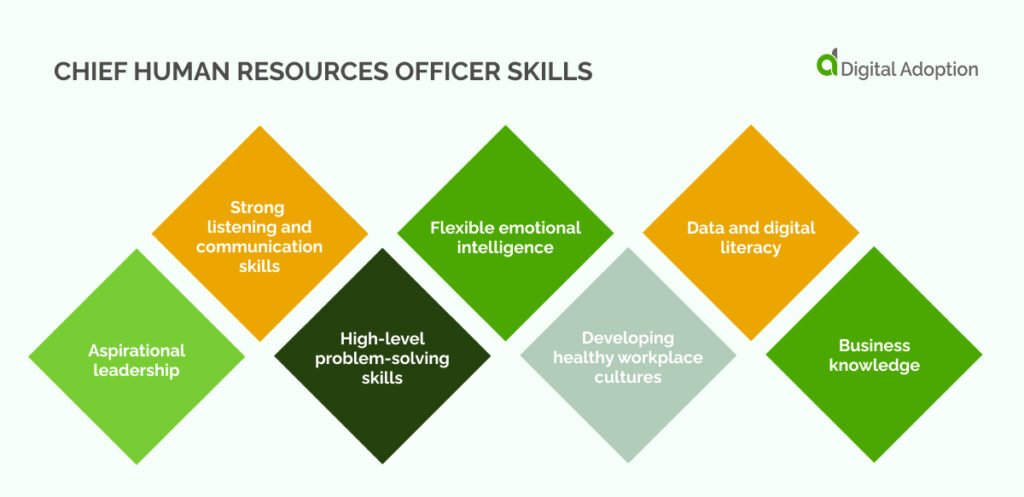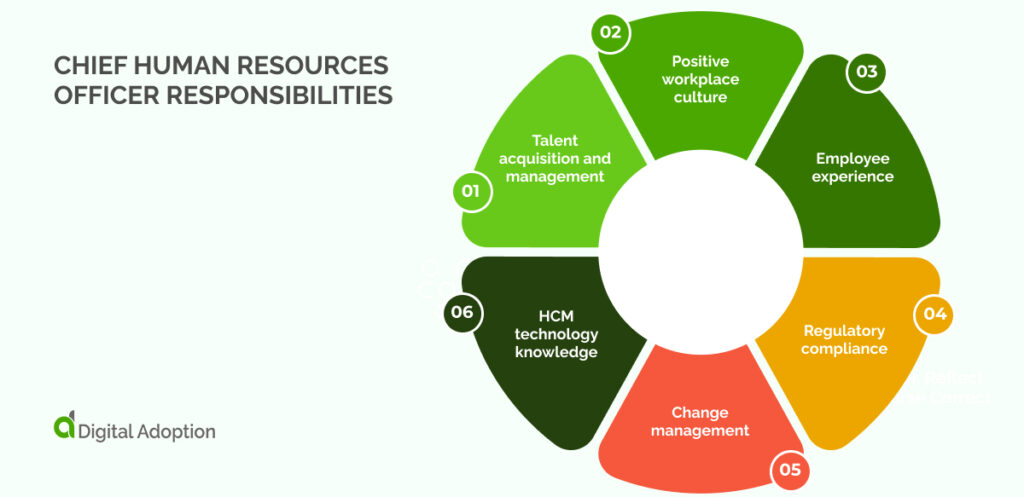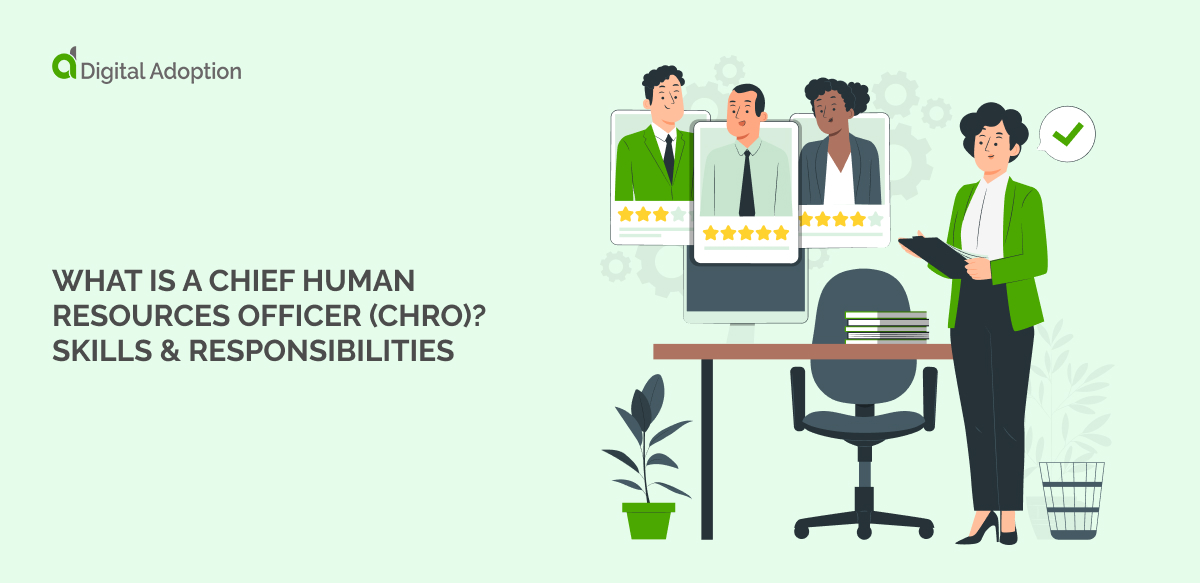Think about the employee journey. Who do they see first as they enter the company via digital employee onboarding, and who wishes them the best as they depart? Which staff tick off the offboarding checklist to give them the best experience?
HR. And who sits at the top of HR? The chief human resources officer (CHRO). They are responsible for providing an excellent employee experience, directly impacting the organization’s success.
The top three concerns for H R leaders in 2024 were employee retention, meeting employee pay expectations, and providing work-life balance. The best CHROs know the latest employee needs and meet them to retain staff, promote workplace wellness, and grow their organization.
This article covers a CHRO definition, skills, responsibilities, and who the CHRO answers to.
When you finish this article, you will know everything about the chief human resources officer role. This information will allow you to utilize someone in this role to support and retain staff and give them the incentive to help your organization innovate, grow, and sustain a successful future.
What is a chief human resources officer (CHRO)?
The chief human resources officer (CHRO) is a C-suite executive responsible for overseeing all human resources processes, attracting and supporting staff, and ensuring policy compliance.
The CHRO attracts, develops, and retains talent through recruitment, employee benefits, and training programs.
This role is essential to enterprise success because it can influence employee decisions to join or leave the organization. Employee retention means higher productivity, innovation, and success.
Chief human resources officer skills

Despite being primarily in an administrative role involving lone work, this HR leader must hold a range of soft skills to ensure employees feel their organization values them by listening and acting on their needs. These skills range from listening and communication to flexible emotional intelligence.
However, HR leaders must also demonstrate hard skills like business knowledge, problem-solving, and data and digital literacy to ensure success in their organization.
Soft and hard skills combine for outstanding results when CHROs seek to gain an overview of their organization via aspirational leadership to create a healthy workplace culture.
Aspirational leadership
Every CHRO must be a strong leader who inspires and motivates employees to achieve their full potential and align with the company’s vision and goals.
They demonstrate aspirational leadership by setting a clear vision, communicating it effectively, leading by example, and championing initiatives that promote growth and development.
This skill is crucial for fostering a motivated and engaged workforce, driving productivity, and ensuring that employees align with the company’s long-term objectives.
Strong listening and communication skills
Communication is essential for HR leaders because they must know what employees need to deliver these needs and keep them employed.
This process includes listening to others actively, understanding their perspectives, and communicating ideas clearly and effectively.
A CHRO uses these skills by holding regular meetings, actively seeking employee feedback, and ensuring transparent communication across all levels of the organization.
Effective listening and communication build trust, resolve conflicts, and ensure everyone is informed and on the same page, which is vital for organizational cohesion and success.
High-level problem-solving skills
Any C-suite position involves high-level problem-solving skills, and the CHRO role is no exception because it is a people-facing role, and people have complicated, changing, and diverse needs. This skill involves analyzing complex issues, identifying root causes, and developing strategic solutions.
They apply these skills by addressing HR challenges such as talent shortages, workplace conflicts, and policy compliance through innovative and strategic approaches.
These skills are essential for navigating the complexities of human resource management and ensuring that the organization can adapt to changes and overcome obstacles efficiently.
Flexible emotional intelligence
Every C-suite executive working within HR must practice emotional intelligence. They must understand and manage their emotions and those of others, adapting to different situations.
High emotional intelligence shows empathy, maintains composure under pressure, and effectively handles interpersonal relationships and workplace dynamics.
This skill is crucial for creating a supportive and positive work environment, improving employee morale, and enhancing leadership effectiveness.
Developing healthy workplace cultures
Developing a healthy workplace culture is a large part of a CHRO’s function and involves creating an environment where employees feel valued, supported, and engaged.
They must promote a healthy culture by implementing policies encouraging work-life balance, inclusivity, recognition, and professional growth opportunities.
A positive workplace culture enhances employee satisfaction, reduces turnover, and attracts top talent, contributing to the enterprise’s overall success and sustainability.
Data and digital literacy
Data and digital literacy for a CHRO involves understanding and using data and digital HR tools, such as ATS (applicant tracking system), employee management tools, and survey and data analytics tools, to make informed decisions.
A CHRO leverages HR analytics (MS Excel, Python), digital platforms, and data-driven insights to optimize recruitment, performance management, and employee engagement strategies. HR leaders are increasingly using ChatGPT prompts for HR to automate processes and allow staff to focus on supporting staff in person.
These skills are vital for staying competitive in a data-driven world, enabling the organization to make strategic decisions based on accurate and relevant information.
Business knowledge
HR leaders must understand their company’s industry, operations, and market dynamics, which helps them find, train, and retain the best talent for their needs.
They demonstrate business knowledge by aligning HR strategies with the company’s goals, understanding financial metrics, and contributing to business planning.
This knowledge ensures that HR initiatives support the broader business objectives, driving overall growth and maintaining the company’s competitive edge.
When you consider the above list of CHRO skills, do they match the skills shown by the person you are currently in this role? If not, offering them further training or support might be necessary.
Chief human resources officer responsibilities

The chief human resources officer oversees and coordinates talent acquisition, development, and retention, which involves several crucial responsibilities.
Talent acquisition and management
The first step of the employee journey is acquisition and management, which involves sourcing, hiring, and retaining skilled employees. Chief HR officers must be confident with this first step to demonstrate their organizational value.
They demonstrate this by developing effective recruitment strategies, using social media or family and friends referral programs, implementing onboarding programs, and promoting career development opportunities.
This responsibility is vital for building a capable and motivated workforce, directly impacting the company’s productivity, innovation, and overall success.
Positive workplace culture
When the HR chief officer builds a positive workplace culture, they promote a supportive, inclusive, and engaging environment for employees and a thriving environment that will likely result in the organization’s completion of KPIs.
They create this culture by advocating for diversity, equity, and inclusion by hiring from diverse backgrounds, celebrating various religious holidays, recognizing employee achievements through employee benefits, and ensuring work-life balance policies.
A positive culture enhances employee satisfaction, reduces turnover, and attracts top talent, contributing to a thriving and sustainable organization.
Employee experience
Employee experience touches everything a CHRO is responsible for. It encompasses all aspects of an employee’s journey, from recruitment to retirement.
A CHRO enhances this by improving onboarding processes, especially for remote workers, offering continuous learning opportunities to promote horizontal employee movement where staff move departments, internal promotions, and creating feedback mechanisms.
A great employee experience boosts engagement, productivity, and loyalty, resulting in a more committed and high-performing workforce.
Regulatory compliance
Regulatory compliance is a significant aspect of the CHRO role because it ensures that the organization adheres to all relevant labor laws and regulations and that employees who don’t follow policies receive disciplinary action.
A CHRO maintains compliance by regularly updating policies, conducting training sessions, incorporating gamification where appropriate to increase engagement, and auditing HR practices to meet legal standards.
Compliance is crucial to avoid legal penalties, safeguard the company’s reputation, and create a fair and safe working environment.
Change management
Change management involves smoothly guiding the organization through transitions and transformations and
A CHRO facilitates this by communicating changes, using each individual’s best employee training method, and providing support during transitions such as mergers or technology implementations. They can also hire external support from change management consultancies.
Effective change management ensures minimal disruption, maintains productivity, and helps employees adapt, contributing to the organization’s resilience and long-term success.
HCM technology knowledge
Knowledge of Human Capital Management (HCM) technology involves the chief HR officer understanding and leveraging digital tools for HR processes.
A CHRO utilizes HCM systems for payroll, performance management, and analytics to streamline operations and make data-driven decisions.
Proficiency in HCM technology enhances efficiency, accuracy, and strategic planning, enabling the HR function to support the business more effectively.
Review the above list of responsibilities with your CHRO and discuss whether they have the support they need to fulfill them all. If the answer is no, discuss ways to support them in achieving every responsibility. Your organization will thank you for it over time.
Who does the CHRO answer to?
A CHRO is a senior executive role, and the CEO is the highest-ranking executive in the company, so the CHRO answers to the CEO.
The CHRO reports directly to the CEO and is part of the senior leadership team. These roles have distinct responsibilities within an organization.
The CHRO oversees the management and development of the company’s human resources, while the CEO is responsible for the organization’s overall direction and performance.
The CHRO needs to think like a team member
CHRO must think like a team member and understand their changing needs within a competitive talent market.
They can start by empathizing with and actively listening to employees’ concerns and feedback. They can also collect views using open communication and transparency through town halls and feedback sessions.
When the chief human resources officer takes these steps, they show employees they care about their needs and will take any steps necessary to meet them.
In response, employees are more likely to stay and become innovative and productive, helping their organization grow and succeed.




![18 Examples of AI in Finance [2025]](https://www.digital-adoption.com/wp-content/uploads/2025/06/18-Examples-of-AI-in-Finance-2025-300x146.jpg)
![14 Examples of AI in Manufacturing [2025]](https://www.digital-adoption.com/wp-content/uploads/2025/06/14-Examples-of-AI-in-Manufacturing-2025-300x146.jpg)
![29 Examples of AI in Education [2025]](https://www.digital-adoption.com/wp-content/uploads/2025/06/29-Examples-of-AI-in-Education-2025-300x146.jpg)
![15 Examples of AI in Retail [2025]](https://www.digital-adoption.com/wp-content/uploads/2025/06/15-Examples-of-AI-in-Retail-2025-300x146.jpg)
![13 Examples of AI in Healthcare [2025]](https://www.digital-adoption.com/wp-content/uploads/2025/06/AI-in-healthcare-examples-300x146.jpg)


![18 Examples of AI in Finance [2025]](https://www.digital-adoption.com/wp-content/uploads/2025/06/18-Examples-of-AI-in-Finance-2025.jpg)
![14 Examples of AI in Manufacturing [2025]](https://www.digital-adoption.com/wp-content/uploads/2025/06/14-Examples-of-AI-in-Manufacturing-2025.jpg)
![29 Examples of AI in Education [2025]](https://www.digital-adoption.com/wp-content/uploads/2025/06/29-Examples-of-AI-in-Education-2025.jpg)